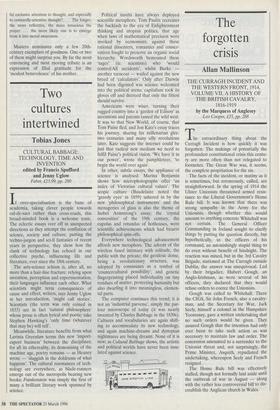Two cultures intertwined
Tobias Jones
CULTURAL BABBAGE: TECHNOLOGY, TIME AND INVENTION edited by Francis Spufford and Jenny Uglow Faber, £15.99, pp. 290 If over-specialisation is the bane of academia, taking clever people towards cul-de-sacs rather than cross-roads, this broad-minded book is a welcome tonic. The eclectic essays veer off in unexpected directions as they attempt the conflation of science, society and culture; putting the techno-jargon and sci-fi fantasies of recent years in perspective, they show how the clank of technology has echoed in our collective psyche, influencing life and literature, ever since the 18th century.
The arts-science schism is, after all, no more than a hair-line fracture: relying upon invention, perception and experimentation, their languages influence each other. What scientists might term consequences of cause and effect, writers, says Jenny Uglow in her introduction, 'might call stories'. Scientists (the term was only coined in 1833) are in fact 'natural philosophers' whose prose is often lyrical and poetic: take Stephen Hawking's 'only time (whatever that may be) will tell'.
Meanwhile, literature benefits from what Lavinia Greenlaw terms this new 'import- export business' between the disciplines; for all its ethereality, its demonising of the machine age, poetry remains — as Heaney wrote — 'sluggish in the doldrums of what happens'. The cultural resonances of tech- nology are everywhere, as blade-runners emerge out of the metropolis bearing new books; Frankenstein was simply the first of many a brilliant literary work spawned by science. Political insults have always deployed scientific metaphors. Tom Paulin recreates the backlash to the era of Enlightenment thinking and utopian politics, that age when laws of mathematical precision were invoked by economists; against these rational dissenters, romantics and conser- vatives fought to preserve an organic social hierarchy. Wordsworth bemoaned these `sages' (ie. scientists) who 'would control/All accidents', whilst Burke another turncoat — wailed against the new breed of 'calculators'. Only after Darwin had been digested was science welcomed into the political arena: capitalism took its gloves off and decreed that only the fittest should survive.
Americans were wiser, turning their rugged country into a 'garden of Edison' as inventions and patents tamed the wild west. It was to that New World, of course, that Tom Paine fled, and Jon Katz's essay traces his journey, sharing his millenarian glee: two centuries and many silly revolutions later, Katz suggests the interne could be just that radical new medium we need to fulfil Paine's political vision. 'We have it in our power', wrote the pamphleteer, `to begin the world over again'.
In other, subtle essays, the appliance of science is analysed. Marina Benjamin shows how microphotographs offer 'an index of Victorian cultural values'. The scopic culture (Baudelaire noted the `greedy eyes' in 1859) ushered in by the new 'philosophical instruments' and the menageries of glass is also the theme of Isobel Armstrong's essay; the 'crystal convexities' of the 19th century, the cupolas and rotundas of hothouses, were scientific achievements which had bizarre philosophical spin-offs.
Everywhere technological advancement affords new metaphors. The advent of the wireless fused intimacy with solitude, the public with the private; the geodesic dome, being a revolutionary structure, was adopted by communes as a symbol of `countercultural possibility'; and genetic fingerprinting placed individuality pn tiny residues of matter, protecting humanity but also dwarfing it into meaningless, elemen- tal parts.
The computer continues this trend; it is not an 'industrial parvenu', simply the par- lour microscope of today (it was nearly invented by Charles Babbage in the 1830s). Cultures and vocabularies are again shift- ing to accommodate its new technology, and again machine-dreams and dystopian nightmares are being dreamt. None of it is new; as Cultural Babbage shows, the artistic and political worlds have never been insu- lated against science.


































































 Previous page
Previous page